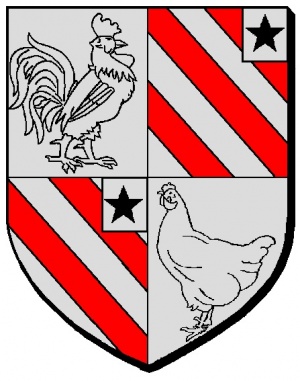Étreillers
ÉTREILLERS
Département : Aisne
| French | Écartelé: au 1er d'argent au coq contourné au trait de sable, au 2e d'argent d'argent à trois bandes de gueules et au franc-canton senestre d'argent à l'étoile de sable, au 3e d'argent à deux bandes de gueules et au franc-canton senestre d'argent à l'étoile de sable, au 4e d'argent à la poule au trait de sable. |
| English | blazon wanted |
Origin/meaning
The arms were introduces in August 2017.
They are inspired by the arms of the Lescot family and a particularity of the local bell tower.
The Lescot family owned most of the Étreillers Estate in the 18th century. Jacques Lescot, lord in part of Étreillers in 1744, was a lawyer, former master of Saint-Quentin by election in 1711, founder of the Old Men's Hospice of this city in 1744. A street of Saint-Quentin bears his name. Three distinct coats of arms for this family are known, which have in common three bands and one (or two) roosters, a canting element (Lescot, les cos, or the roosters in Picardian dialect). The arms are based on the arms of Jacques Lescot as provided by d'Hozier; quarterly, 1 and 4 of silver with a rooster of silver, and 2 and 3 sable with three goldeb bends accompanied in chief of a star of the same.
The roosters in 1 and 4 have been replaced by a rooster and chicken taken from the wind vanes at the local bell tower; one is a rooster, the other a chicken. Local tradition claims that the lord of Étreillers, offered one weather vane with the rooster from his arms; to thwart what some considered a noble will to assert its power, a popular quest was made, which financed the installation of a chicken.
Literature: Image from http://www.armorialdefrance.fr
Contact and Support
Partners:
Your logo here ?
Contact us
© since 1995, Heraldry of the World, Ralf Hartemink 
Index of the site










